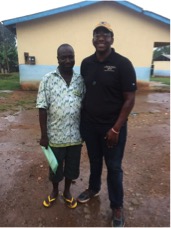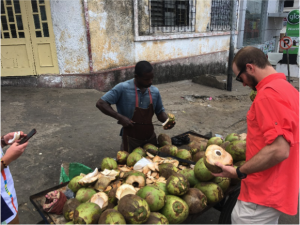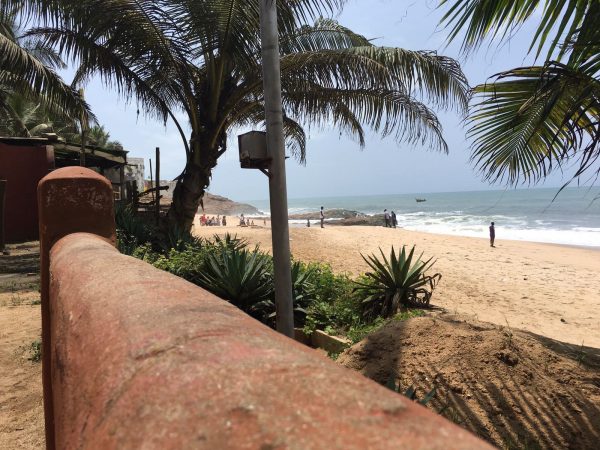I was awakened from my Sunday afternoon nap by a call from my caretaker, Aki. He informed me that I am to meet him at his home immediately because in less than 30 minutes, we are to meet with the chief of Akwadum! Still disoriented from my nap, I jumped out of bed, heart racing, as I rushed to Aki’s house. After meeting Aki at his compound, we started to make our  way toward the chief’s palace. Sweaty palmed and sweaty browed, I began to ask a laundry list of questions to Aki about the chief. Is he nice to guests? Is he very strict and mean? What if I answer a question incorrectly or don’t know an answer for one of his questions? My anxiety bubbled up as we journeyed closer to the chief’s home. In the distance, I noticed a familiar site on the road side; a coconut stand. With sweat dripping down my back, I imagined how refreshing a coconut would be in the blazing Ghana sun, but unfortunately, “we don’t have the time,” I thought to myself. As we began to pass the stand I heard a surprising phrase from my caretaker. “Mepe se metu kube ma mo,” which means “I want to buy a coconut for you” in Twi. Excited at the thought of having a fresh coconut in my grasp, my angst about meeting the chief came rushing back to me. In my effort to stay focused, I exclaimed to my caretaker that we don’t have time for this because we need to go and meet the chief! Aki’s response was a perfectly calming rebuttal. “There’s always time to stop and have some coconut.” Surrendering, I graciously agreed. As the cool and sweetness of coconut milk began to wash away my thirst, my anxiety and fears about our meeting also washed away. Refreshed and hydrated, Aki and I continued our way to the chief’s palace.
way toward the chief’s palace. Sweaty palmed and sweaty browed, I began to ask a laundry list of questions to Aki about the chief. Is he nice to guests? Is he very strict and mean? What if I answer a question incorrectly or don’t know an answer for one of his questions? My anxiety bubbled up as we journeyed closer to the chief’s home. In the distance, I noticed a familiar site on the road side; a coconut stand. With sweat dripping down my back, I imagined how refreshing a coconut would be in the blazing Ghana sun, but unfortunately, “we don’t have the time,” I thought to myself. As we began to pass the stand I heard a surprising phrase from my caretaker. “Mepe se metu kube ma mo,” which means “I want to buy a coconut for you” in Twi. Excited at the thought of having a fresh coconut in my grasp, my angst about meeting the chief came rushing back to me. In my effort to stay focused, I exclaimed to my caretaker that we don’t have time for this because we need to go and meet the chief! Aki’s response was a perfectly calming rebuttal. “There’s always time to stop and have some coconut.” Surrendering, I graciously agreed. As the cool and sweetness of coconut milk began to wash away my thirst, my anxiety and fears about our meeting also washed away. Refreshed and hydrated, Aki and I continued our way to the chief’s palace.
For about a week now, I have been in my community here in Akwadum and honestly, things have been slow moving for me. Don’t get me wrong, it has been absolutely amazing meeting members of the community, engaging with some students here and there, and exploring different parts of my community and the surrounding area. All of this has been great, but it has been quite an adjustment for me to get used to the slower, slightly more relaxed way of life here. In my undergraduate studies, I got used to a high speed, always busy, rarely having time to myself, overdrive type of lifestyle.
Here, I have mostly experienced the complete opposite lifestyle. One which is slower paced, with a lot of free time (at least after school), and plenty of time to myself to determine what I want to do. My desire and mindset is to spend this free time impacting people’s live in a positive way, making big strides in the development of my community, and so much more. This surplus amount of free time is irregular for me and has left me overwhelmed at times. The potential for positive change here is so great that I put this pressure on myself to make big impacts and to do it fast. However, in reflection, I realized that my expectations for my achievements have been unrealistic. I have been looking for my successes to be on a grand scale. As I enter my second week here in my community, I realize that any impact that I make will take time. Because I have become so accustomed to a fast-paced life style, with few breaks, and always looking to make something happen, it has forced me to reevaluate things. My first week here has taught me that sometimes I need to just slow, stop, and relax. Being too high intensity too often is not only unsustainable, it will burn you out. I’ve had it happen on a few occasions during my undergraduate studies. There’s no better time for me to learn that lesson than right here and right now.
after school), and plenty of time to myself to determine what I want to do. My desire and mindset is to spend this free time impacting people’s live in a positive way, making big strides in the development of my community, and so much more. This surplus amount of free time is irregular for me and has left me overwhelmed at times. The potential for positive change here is so great that I put this pressure on myself to make big impacts and to do it fast. However, in reflection, I realized that my expectations for my achievements have been unrealistic. I have been looking for my successes to be on a grand scale. As I enter my second week here in my community, I realize that any impact that I make will take time. Because I have become so accustomed to a fast-paced life style, with few breaks, and always looking to make something happen, it has forced me to reevaluate things. My first week here has taught me that sometimes I need to just slow, stop, and relax. Being too high intensity too often is not only unsustainable, it will burn you out. I’ve had it happen on a few occasions during my undergraduate studies. There’s no better time for me to learn that lesson than right here and right now.
There are still several questions that I have yet to answer. How can I push for change without pushing myself into a state of exhaustion? How do I focus on the great opportunities for development and impact in my community, while also taking the time not to forsake my own personal growth? How will I adjust to the slower paced culture in my community without losing my motivation and drive? I know that adjusting to this lifestyle won’t be easy and certainly won’t happen overnight, but I know with reflection and patience for myself and my impact, I will grow.
The most important part is to remind myself to stop and have a coconut.
Eli Hugghis received a degree in Botany from Purdue University. Before becoming an AgriCorps Fellow, Eli was involved with MANRRS and worked with local high schools to establish Junior MANRRS clubs.


